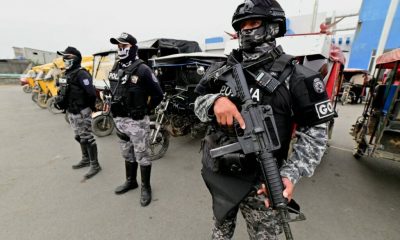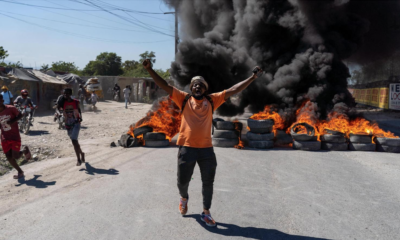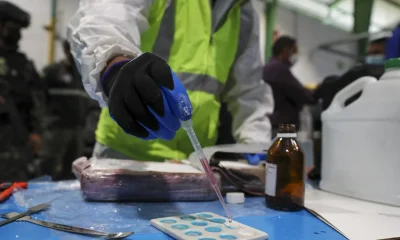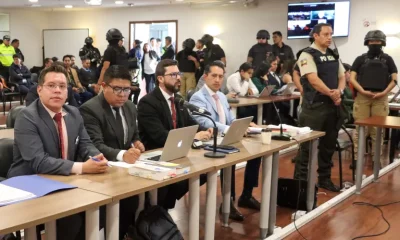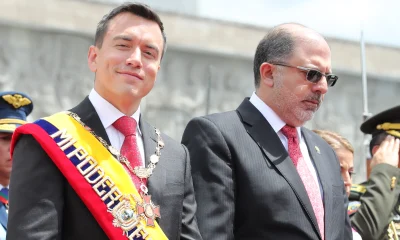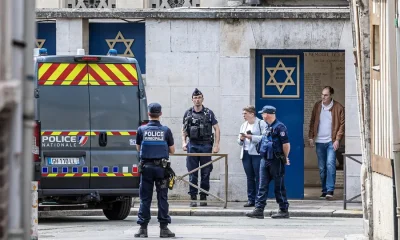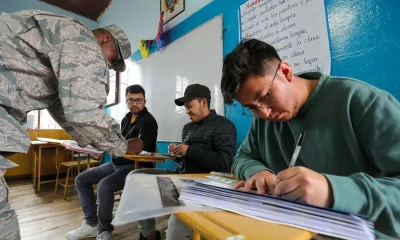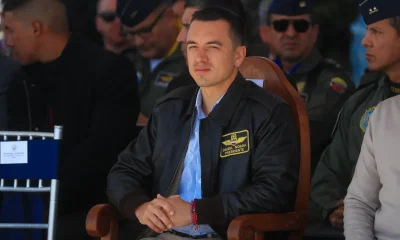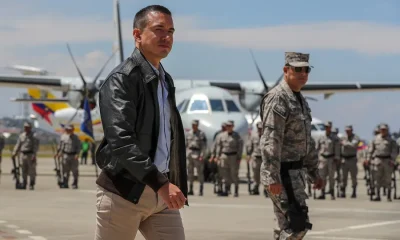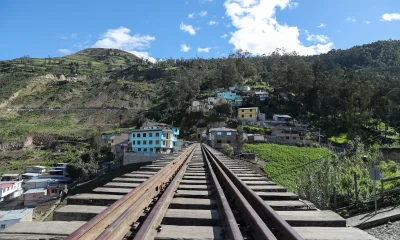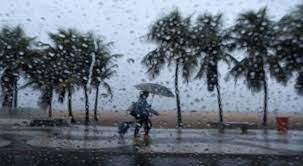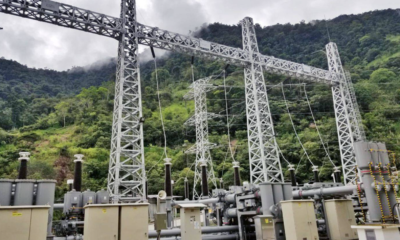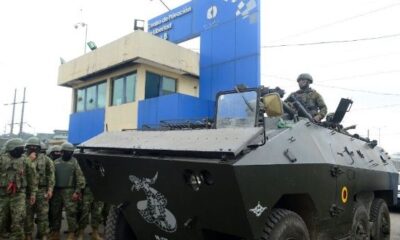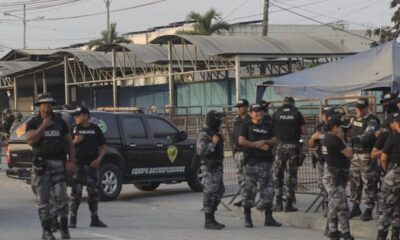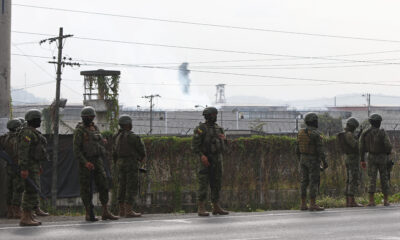International
Police killed, guards held in gang violence-stricken Ecuador
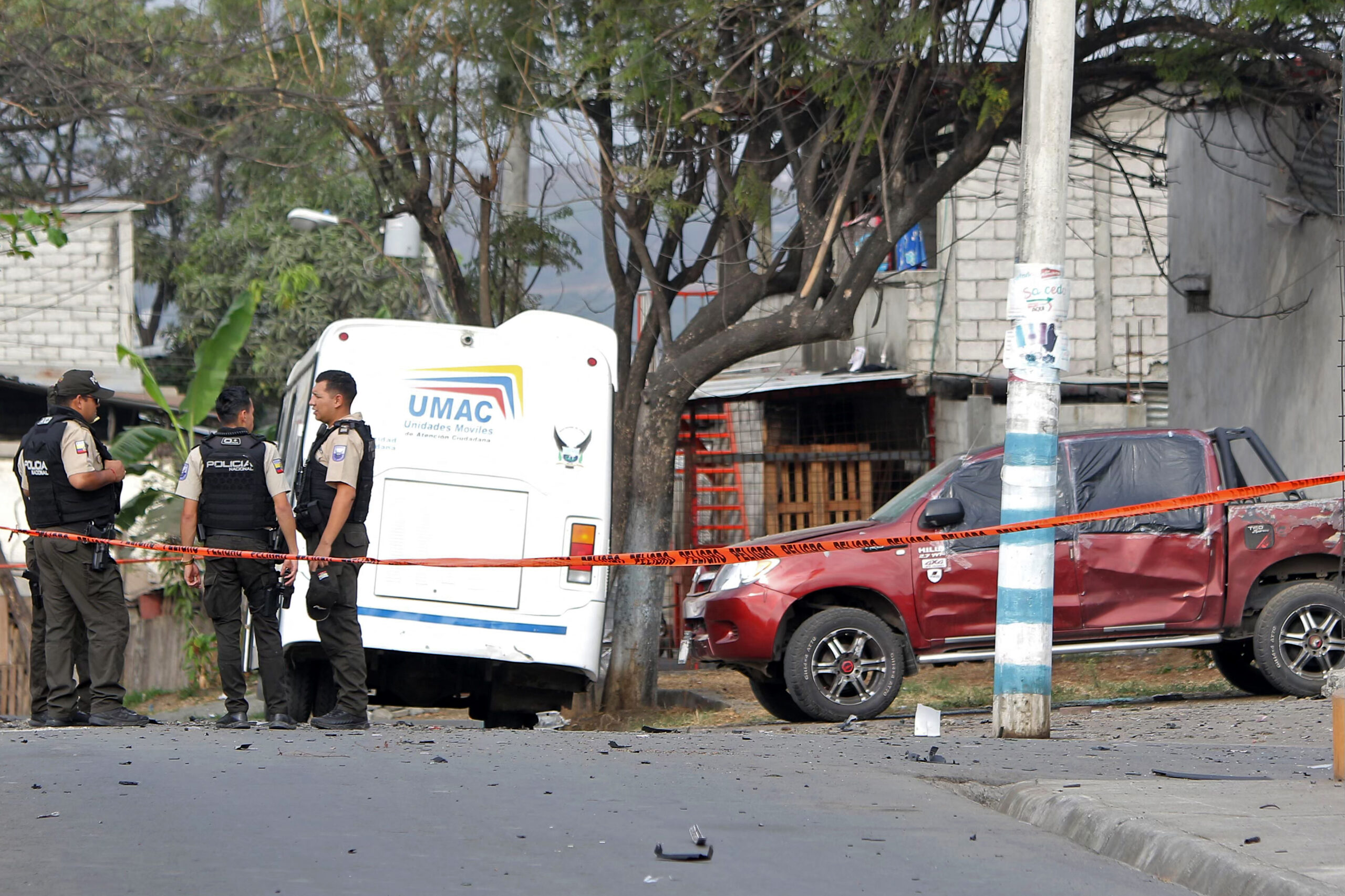
| By AFP |
Two police officers were killed, two more wounded and prison guards taken hostage Tuesday in the latest wave of attacks in a deadly gang war consuming Ecuador, authorities said.
Officials said “organized crime” groups responded to the transfer of detainees from the Guayas 1 prison with nine attacks using explosives and firearms.
The prison, in the southwestern port city of Guayaquil, is one of the main scenes of a series of bloody prison massacres that have left about 400 inmates dead since February 2021.
“We have had reactions” of “organized crime” in Guayaquil and in the northwestern oil port of Esmeraldas, Interior Minister Juan Zapata told reporters in the capital, Quito.
These included car bomb attacks.
In the early morning hours, two police officers died when their patrol car was attacked by people with firearms in Guayaquil, according to police. A separate attack on a police station in Guayaquil left two officers injured.
In Esmeraldas — the same city where two beheaded bodies were found hanging from a pedestrian bridge on Monday — inmates took eight guards hostage, according to the SNAI prison authority.
A video circulated on Twitter appears to show two guards with explosives tied to their bodies and a man claiming to be an inmate denouncing prison “corruption.” AFP could not independently verify the video.
“If war is what they want, war is what they’ll get,” says the man, his face obscured, adding: “We will use these guards.”
‘Find the perpetrators’
Police commander General Fausto Salinas said at the press conference in Quito that four of the guards were since released.
The SNAI had earlier announced on Twitter that it was moving about 200 inmates from the Guayas 1 prison in Guayaquil. It said the transfers were necessitated by required maintenance to cell blocks. But according to the purported hostage video, the move was the reason for the events at Esmeraldas.
“Given the events in Esmeraldas and GYE (Guayaquil), we activated our tactical and investigative units to maintain order and find the perpetrators,” the police said on Twitter.
Once a relatively peaceful neighbor of major cocaine producers Colombia and Peru, Ecuador has seen a wave of violent crime that authorities blame on turf battles between rival drug gangs believed to have ties to Mexican cartels.
Hundreds of inmates have been killed — many beheaded or incinerated — as the fighting spilled into prisons. Civilians have increasingly been caught up in the violence, which has included a spate of car bombs.
The violence has claimed 61 police lives since last year. Ecuador has gone from being a drug transit route in recent years to an important distribution center in its own right, with the United States and Europe the main destinations.
The murder rate in Ecuador nearly doubled in 2021 to 14 per 100 000 inhabitants, and reached 18 per 100,000 between January and October this year. In 2021, law enforcement seized a record 210 tons of drugs, mostly cocaine. So far this year’s seizures total 160 tons.
International
Rubio rules out 2028 presidential bid if Vance runs

U.S. Secretary of State Marco Rubio said he would not seek the presidency in 2028 if current Vice President JD Vancedecides to run as the Republican nominee to succeed President Donald Trump.
“If JD Vance runs for president, he will be our candidate, and I will be one of the first people to support him,” Rubio said in an interview with Vanity Fair, in which he appeared alongside other senior members of the presidential cabinet.
Rubio, 54, and Vance, 41, are widely viewed as two of the leading Republican figures who could headline the party’s ticket in the 2028 election. Under the U.S. Constitution, Trump is barred from seeking another term after completing two presidential mandates.
In a lighthearted moment during the interview, Vance jokingly offered photographers $1,000 if they managed to make him look better than Rubio in the photos. Both leaders have received public backing from Trump, who last October floated the idea of a joint ticket featuring Rubio and Vance, without clarifying who would lead it.
“I think that if they ever teamed up, they would be unstoppable. I don’t think anyone would run against us,” Trump said at the time.
White House Chief of Staff Susie Wiles, who also took part in the interview, confirmed that Trump does not intend to violate the 22nd Amendment, which prohibits a third presidential term, though she acknowledged that the president is “having fun” with speculation about a possible return to office.
Rubio, the son of Cuban immigrants, served as a Republican senator from 2010 to 2025. He sought the party’s presidential nomination in 2016 but was defeated by Trump after a bruising primary contest. His name was floated as a potential vice presidential pick in 2024, but Vance ultimately secured the spot. After taking office, Trump appointed Rubio as secretary of state, making him the first Latino to hold the position.
International
Authorities search for armed and dangerous suspect in fatal Brown University attack

According to the statement, investigators are “seeking the public’s help to identify and speak with an individual” who was seen “near” the suspect at the time of the attack.
The Providence Police Department in Rhode Island released three photos of the person of interest, whose face has been blurred. In the images, the individual is wearing navy blue clothing, what appears to be a green hood, and carrying a light-colored backpack.
Earlier, authorities had released several photos and videos of a suspect described as “approximately 5 feet 8 inches tall, with a stocky build,” dressed in dark clothing, with their face covered by a surgical mask and wearing a beanie. The suspect’s identity remains unknown.
Authorities are offering a $50,000 reward for any information leading to the identification, arrest, and conviction of the person responsible for the killings, who is considered armed and dangerous.
The gunman opened fire on Saturday at Brown University’s engineering and physics building, where exams were being held, killing students Ella Cook and Mukhammad Aziz Umurzokov. The names of the nine people injured have not been released.
International
Police investigate deaths of Rob Reiner and wife as apparent homicide

The Los Angeles Police Department (LAPD) is investigating the deaths of Hollywood actor and filmmaker Rob Reinerand his wife as an “apparent homicide,” amid a wave of tributes to the director of classics such as When Harry Met Sally.
According to U.S. media reports on Sunday, Rob Reiner and Michele Singer Reiner were found dead at their Los Angeles mansion with what appeared to be stab wounds.
Several political figures shared messages of condolence following the reported deaths of the director of A Few Good Menand his wife.
While the LAPD did not officially confirm the identities of the victims, it stated that homicide detectives were dispatched to the Reiner residence.
“At this time, no additional details are available and the investigation into an apparent homicide is ongoing,” the Los Angeles Police Department said in a statement posted on social media.
LAPD Deputy Chief Alan Hamilton told reporters that no arrests have been made and that no individuals are currently being questioned as suspects.
“I’m not going to confirm whether anyone is being questioned at this moment or not. We are going to try to speak with as many family members as we can,” Hamilton said.
CNN reported that a family spokesperson confirmed the deaths of Reiner and his wife.
California Governor Gavin Newsom, former U.S. President Barack Obama, and former Vice President Kamala Harrisissued statements expressing their condolences.
-

 Central America4 days ago
Central America4 days agoPanama seizes over three tons of drugs hidden in Caribbean port container
-

 International3 days ago
International3 days agoPolice investigate deaths of Rob Reiner and wife as apparent homicide
-

 Central America3 days ago
Central America3 days agoOAS urges swift recount in Honduras as election results remain uncertain
-

 International5 days ago
International5 days agoSeveral people shot in attack on Brown University campus
-
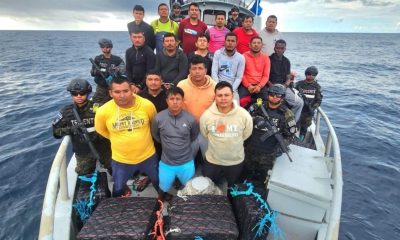
 Central America2 days ago
Central America2 days agoEl Salvador ranks among top countries in the Americas in fight against organized crime
-

 Central America2 days ago
Central America2 days agoBukele says AI partnership with xAI will transform public education in El Salvador
-

 International5 days ago
International5 days agoU.S. and Mexico Reach Deal to Address Water Deficit Under 1944 Treaty
-

 International1 day ago
International1 day agoRubio rules out 2028 presidential bid if Vance runs
-

 Central America1 day ago
Central America1 day agoArrests and clashes in Tegucigalpa as vote count continues after Honduras election
-

 International1 day ago
International1 day agoAuthorities search for armed and dangerous suspect in fatal Brown University attack





























